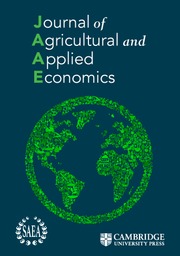No CrossRef data available.
Article contents
Commodity Models and Their Contribution to Congressional Policymaking: Reflections from the 2002 Farm Bill and Beyond: Discussion
Published online by Cambridge University Press: 28 April 2015
Extract
The organizers of this session asked me to do two things: to place policy modeling into the context of both general congressional policymaking and that of the 2002 Farm Bill and to comment on the three papers of the session.
Commodity models provide results that are useful for congressional decision making. Expected impacts of proposed policies on supply, demand, prices, and income are of interest to members of Congress. But decisions by policymakers depend on a variety of factors beyond model results, including professional backgrounds and perspectives, personal experiences, familiarity with proposed and alternative policies, views of key constituents, and ideologies. Many policy changes are incremental. So while model results are important to the policymaking process, they rarely are the key determinant as to why one proposed policy trumps another.
- Type
- Invited Paper Sessions
- Information
- Copyright
- Copyright © Southern Agricultural Economics Association 2004


